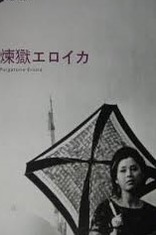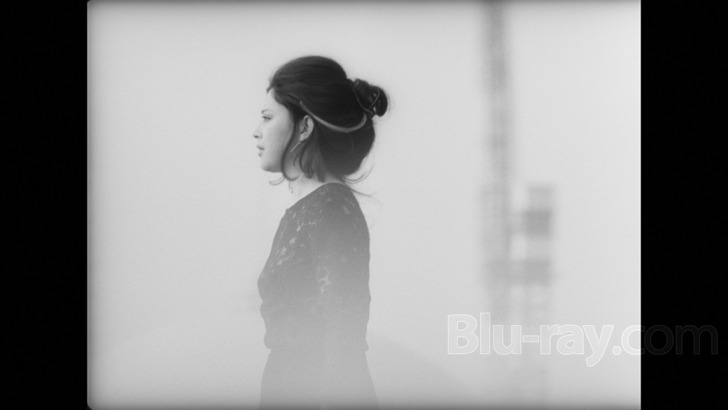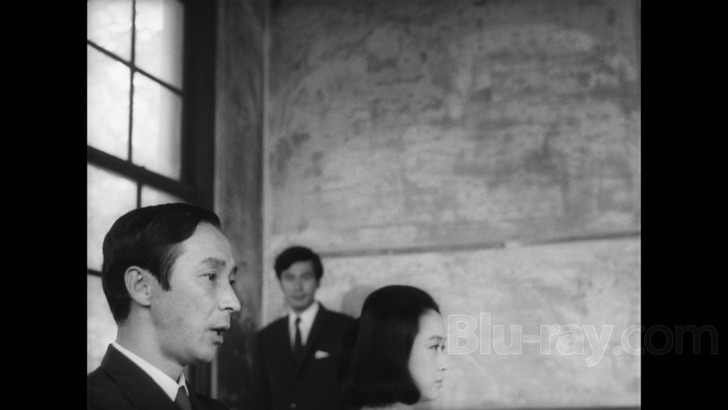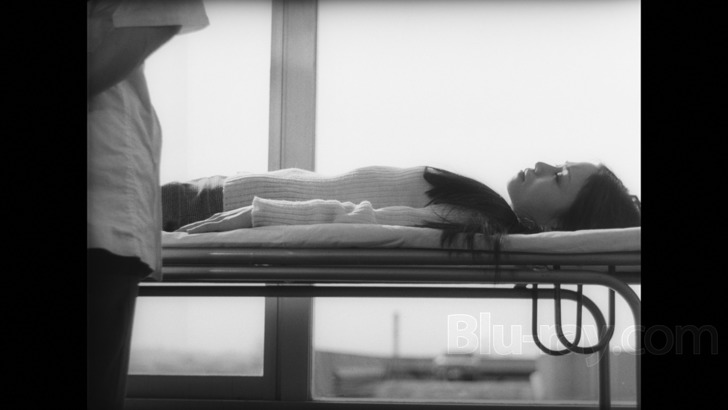Heroic Purgatory Blu-ray Movie
HomeHeroic Purgatory Blu-ray Movie 
煉獄エロイカ / Blu-ray + DVDArrow | 1970 | 118 min | Not rated | No Release Date

Price
Movie rating
6.7 | / 10 |
Blu-ray rating
| Users | 0.0 | |
| Reviewer | 3.5 | |
| Overall | 3.5 |
Overview
Heroic Purgatory (1970)
An engineer's wife returns home with a lost teenager. A man posing as her dad tries to get her back, causing the engineer to recall his youth as a revolutionary, obscured by dreamlike disruptions of time and space, fantasy and reality.
Starring: Mariko Okada, Kaizo Kamoda, Naho Kimura, Yoshiaki Makita, Kaneko IwasakiDirector: Kiju Yoshida
| Foreign | Uncertain |
| Drama | Uncertain |
Specifications
Video
Video codec: MPEG-4 AVC
Video resolution: 1080p
Aspect ratio: 1.35:1
Original aspect ratio: 1.37:1
Audio
Japanese: LPCM Mono
Subtitles
English SDH
Discs
Blu-ray Disc
Two-disc set (1 BD, 1 DVD)
DVD copy
Playback
Region A (B, C untested)
Review
Rating summary
| Movie | 3.5 | |
| Video | 4.5 | |
| Audio | 3.5 | |
| Extras | 2.0 | |
| Overall | 3.5 |
Heroic Purgatory Blu-ray Movie Review
Reviewed by Jeffrey Kauffman May 10, 2017Note: This film is available as part of the box set Kiju Yoshida: Love + Anarchism.
A lot of the forum activity on this site as well as others devoted to home theater aficionados tends to be filled with complaints about this or that
release, or even the state of physical media in general. I’d like to “accentuate the positive” for a moment, by acknowledging the fact that without
a
bevy of so-called “niche” labels like Criterion, Kino Lorber, Olive Films and, yes, Arrow (and its Arrow Academy imprint), those of us who love all
sorts
of different films would be much less significantly blessed with releases than we actually are, despite whatever technical issues arise from time to
time with any given release. Consider for a moment the name of Kiju Yoshida, an
arugably lesser remembered Japanese director whose name may not be recognized by many and which in fact was not even in our database here
at
Blu-ray.com until I added it for the purposes of this review and the reviews of the films in this set. It’s almost astounding in a way that any label
would devote its resources to releasing films by someone whose name doesn’t rise to traditional “marquee” levels, and for the efforts of labels like
Arrow who do offer sets like this one, I for one would just like to take a moment to offer some sincere appreciation. Yoshida, whose given name
was
Yoshishige, was born in 1933 and is still among the living (at the age of 84) as these reviews are being written. While Yoshida may not be as well
known in the United States as some of his Japanese contemporaries, in France he’s lionized as one of the most important directors of the post-
World
War II era, and that recognition may be especially understandable when placed within the context of what is kind of humorously referred to as the
Shōchiku Nouvelle Vague, or in more common vernacular, the Japanese New Wave (with a reference to the specific studio where Yoshida
and
some of his cohorts worked). The structural (or deconstructural, as the case
may be) proclivities of the French New Wave are shared by Yoshida, at least in the three films presented in this set, all of which defy traditional
narrative methods and which employ typical Nouvelle Vague approaches like quasi-montage and disjunctive editing techniques. The three
films in this set span a few years bridging the late sixties to the early seventies, and all three of them are considered part of a kind of loose trilogy
which offers a somewhat subversive political perspective with a similarly anarchic style.

David Desser rather hilariously references the late if not exactly lamented IMDb Message Boards while discussing Heroic Purgatory, stating that the only post on the page for the film kind of plaintively asked for help in figuring out what exactly this film is about. Even Desser, one of the most respected experts dealing in Japanese cinema in general and Kiju Yoshida in particular, doesn't offer any substantial clues in his introduction or his scene specific commentaries, suggesting instead that Heroic Purgatory is one of those films that needs to be experienced, which is not necessarily to say it's going to be understood in any case.
There is a storyline in Heroic Purgatory, although much like Yoshida’s approach in the previous year’s Eros + Massacre, it’s often buried beneath a near hallucinatory parade of surreal imagery. While many Westerners may not be overly aware of the political roiling within Japan, especially since that island nation is often seen as a “junior democracy” following in the footsteps of its World War II vanquisher, the United States, there evidently was a strong Communist element at play, something Yoshida attempts to delve into, however discursively, in this film.
As with Eros + Massacre, past and present collide, if not exactly commingle as much as they do in the previous film. An engineer confronted with a girl who claims she is his daughter sends him into a near reverie of memories about his radical youth, which is where Communism comes into the story. It’s an odd, disjointed narrative in any case, with no real clear through line, something that allows Yoshida full rein for his at times kind of bizarre stylistic tendencies.
Heroic Purgatory Blu-ray Movie, Video Quality 

Heroic Purgatory is presented on Blu-ray courtesy of Arrow Academy with an AVC encoded 1080p transfer in 1.35:1. Arrow provides only a kind of generic statement about these transfers in its insert booklet:
The transfers of Eros + Massacre, Heroic Purgatory and Coup d'état were supervised and approved by Kiju Yoshida, and supplied to Arrow Films on master tape via Carlotta Films, France.This is to my eyes the strongest looking transfer in the Yoshida set, one graced by really impressive black levels and nice looking contrast, and one which is arguably helped (in terms of detail levels) by a relative lack of the "overexposure" exhibited in both versions of Eros + Massacre. As can clearly be seen in many of the screenshots accompanying this review, Yoshida is downright deconstructionist at times in terms of how he places objects in the frame, and as such expected fine detail elements like facial pores and the like are often absent simply because Yoshida will shunt the humans off to the side (or to the top, or to the bottom) of the frame and instead let some inanimate object take "center stage" (so to speak). With that understanding in place, though, this is often a really ravishing looking presentation, with well modulated gray scale, clear delineation of lighter gradients, and an appealingly organic looking grain field.
Heroic Purgatory Blu-ray Movie, Audio Quality 

Heroic Purgatory features an LPCM Mono track (in the original Japanese) that has some of the same slight disturbances in the upper registers that is also evident on Coup d'état's track, especially with regard to the astringent score, one which combines some electronic effects with modern, quasi-dodecaphonic orchestral cues. The film has a rather arresting sound design, one which features lots (as in lots) of echoing footsteps in cavernous halls, and those elements sound clear and bright. Dialogue also is presented well. The track has a kind of boxy and narrow sound that is no doubt a product of its era.
Heroic Purgatory Blu-ray Movie, Special Features and Extras 

- Introduction by Kiju Yoshida (1080p; 6:08) is a quite interesting piece where Yoshida discusses the conflict between democratically minded Japanese and communist counterparts in the wake of the Korean War.
- Introduction by David Desser (1080p; 9:14) has some nice self effacing humor by Desser, who confesses up front that he has little clue as to how to explain, or maybe even describe, Heroic Purgatory.
- Commentaries by David Desser
- Opening (1080p; 3:04)
- Death? (1080p; 1:58)
- Conflation (1080p; 10:54)
- Molestation (1080p; 2:51)
- Blackmail (1080p; 2:20)
- Ritsuko (1080p; 5:25)
- Tension (1080p; 3:45)
- Trial (1080p; 4:30)
- 1980 (1080p; 8:19)
- Interviewers (1080p; 4:08)
- Theatrical Trailer (1080p; 3:03)
Heroic Purgatory Blu-ray Movie, Overall Score and Recommendation 

Heroic Purgatory is the most obtuse of the three films in this set, but even those who don't understand much if anything that's being presented may marvel at how the content is being presented. Yoshida's visual (and in this film, audio) flair is undeniable, and the film is near hallucinatory. Video looks great, while audio encounters a few minor hurdles. Supplemental material is also quite interesting. Recommended.
Similar titles
Similar titles you might also like
(Still not reliable for this title)

Coup d’état
戒厳令
1973

Eros + Massacre
エロス+虐殺
1969

The Image Book
Le livre d'image
2018

Mandala
Mandara / 曼陀羅
1971

Transit
2018

Poem
Uta / 哥
1972

Zama
2017

The Flower of Evil
La fleur du mal | 4K Restoration
2003

Goodbye to Language 3D
Adieu au langage
2014

This Transient Life
無常 / Mujō
1970

Things to Come
L'avenir
2016

Tout Va Bien
1972

Out 1
Out 1, noli me tangere
1971

Sarah's Key
Elle s'appelait Sarah
2010

La Chinoise
1967

The Measure of a Man
La Loi du Marché
2015

Masculin Féminin
1966

Diary of a Chambermaid
Le journal d'une femme de chambre
1964

Le Petit Soldat
The Little Soldier
1963

Ivan's Childhood
Ива́ново де́тство / Ivanovo detstvo
1962